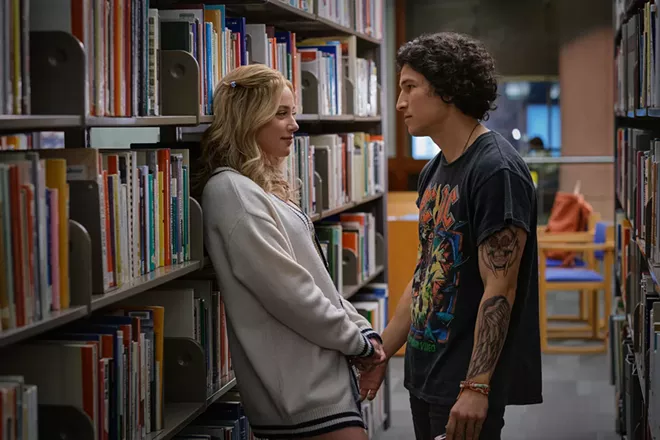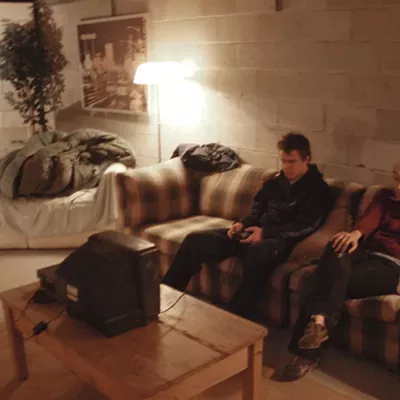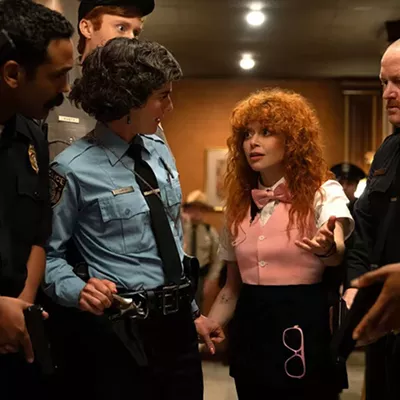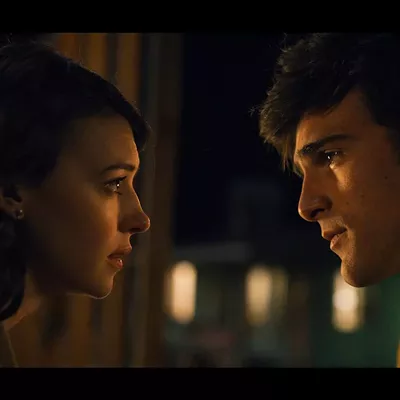As a way to cram two mediocre rom-coms into a single movie, Netflix original production Look Both Ways has the life of main character Natalie (Riverdale's Lili Reinhart) split along two paths, diverging on the night of her college graduation. After a one-night stand with her friend Gabe (Danny Ramirez), Natalie is worried that she might be pregnant. She takes a pregnancy test, and the movie follows her as she deals with both possible outcomes. It's a duller, more predictable take on the delightful 1998 Gwyneth Paltrow comedy Sliding Doors, with minimal humor and minimal passion. Like the recent short-lived NBC drama series Ordinary Joe, it finds multiple ways to make the same person's life uninteresting.
The pregnant version of Natalie decides to forgo her plans of moving to Los Angeles with her best friend Cara (The Bold Type's Aisha Dee) and instead move back in with her parents (Andrea Savage and Luke Wilson) in Austin to save money while preparing to give birth. Although Gabe supports her decision to have the baby, the two of them keep their relationship platonic, and she even encourages Gabe to date other women. Natalie also puts her dreams of working in animation on hold, but it's not hard to guess how both her career aspirations and her connection with Gabe will work out eventually.
It's only slightly harder to guess how things will go for the non-pregnant Natalie, who does move to LA with Cara and takes a job working for her animation idol, Lucy (Nia Long). She has a mild meet-cute with burgeoning documentary producer Jake (David Corenswet), and they quickly fall into an obligatory relationship. Reinhart is bubbly and likable, but both of Natalie's romances are bland and lifeless, and she barely has any chemistry with either of the male leads. Natalie's pregnancy is the only convincing evidence of any sexual connection between her and her two paramours.
Screenwriter April Prosser throws in various parallels to show how both Natalies experience the same hopes and the same doubts, although Natalie is a pretty shallow character in both iterations, and Reinhart doesn't do much to differentiate the two. At least she has more dimensions than Gabe or Jake, whose own vaguely defined interests exist only in relation to Natalie's latest mini-crisis. And poor Cara gets only the barest hints of her own subplots in each timeline, with girlfriends who show up as essentially background details in a handful of scenes. The friendship between Natalie and Cara is as thinly developed as the romances.
Look Both Ways takes place over a period of five years, but often the only way to tell how much time has passed is by observing the growth of Natalie and Gabe's daughter. Especially in the LA timeline, there's so little plot progression that it seems like the characters have just been standing around doing nothing for years at a time. Natalie never meets anyone new or pursues any new goals, and the movie plods dutifully toward its predetermined end, which still somehow takes nearly two hours.
Kenyan filmmaker Wanuri Kahiu, whose 2018 LGBTQ drama Rafiki was a film festival sensation, makes her American directorial debut with the kind of anonymous product that seems like it could be helmed by anyone, lacking any distinctive style or personal vision. The entire finale is nearly indistinguishable from a promotional video for South by Southwest, which represents the pinnacle of artistic achievement for both Natalies. Lucy tells LA Natalie that the most important thing is to bring her authentic self to her art, but there's nothing authentic about this prefab piece of faux-empowerment.♦



















